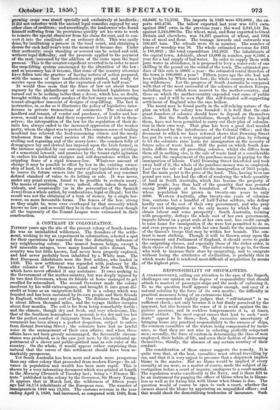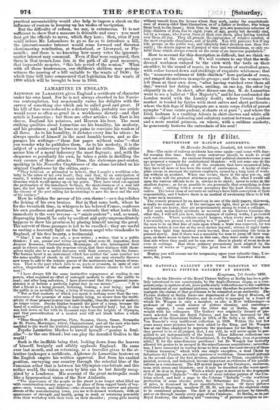RESPONSIBILITY OF SHIPMASTERS.
A CORRESPONDENT, calling our attention to the case of the Superb, challenges our opinion on the degree of responsibility that should attach to masters of passenger-ships and the mode of enforcing it. To us the question itself appears simple enough, and easy of a natural solution by the force of its own merits ; the difficulty in practical measures being of an extraneous kind.
Our correspondent rightly judges that " self-interest" is no sufficient check ; not only because it is but dimly perceived by the ignorant, but also because the sense of it is weak against the im- pulsive passions, and in reckless temperaments it is, at times, almost extinct. The most cogent causes that lead to such " acci- dents " appear to be these,—first, the excessive uncertainty of bringing home any practical responsibility to the owners of ships, the common casualties of the waters being compensated by insur- ance, so that they are not nice in selecting perfectly competent men; secondly, the force of custom in determining the class of men employed, their habits of life, and even their fashion of demeaning themselves; thirdly, the absence of any certain scrutiny of their conduct.
The consideration of these causes suggests the remedy. It is quite true that, at the best, casualties must attend travelling by sea, and that it is very unjust to presume that a shipwreck implies blame in the master. But no blame would be implied if every casualty at sea were, as a matter of course, made the subject of in- vestigation before a court of inquiry, analogous to a court-martial. The regulation works excellently in the Navy, and is there felt to be an instrument for purging the officer of blame when he is blame- less as well as for fixing him with blame when blame is due. The question would of course be open to such a court, whether the owners shared the blame by appointing an unqualified officer; and this would check the demoralizing tendencies of insurance. &Loh
practical accountability would also 'help toimpose a check on:the influence of custom ing-up laxnrodes -of 'navigation. kee
Bnt the difficulty of •• rem, we -say, is extraneous. It -is not -sufficient to show-iirat-a measure is desirable and easy- you Misfit -first get the officials to move, which they hate ; then, even if you could induce Mr. Labonehere to -go so far as to introduce a bill -the- ignorant-master. interest -would come forward -and threaten electioneering retributien, at fhurderland, or Liverpool, or Ply- month ; and-there is no 4rnoWing how many votes the -ignorant- mater interest may comma:tut. Even if that were conquered, then there is that treractions lien in the path of ill good measures, that impassable monster, " this late period of the session.'What with all them histderances, our children's 'children may perhaps -witness the passing of a 'bill .suitable to 'the -wants -of 1-850 ; which time 'will have vonimeneed thatlegislation for the -wants 1900 which will be 'brcorglit to bear in 1950.



























 Previous page
Previous page